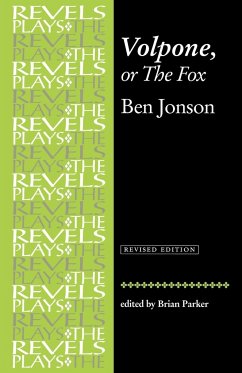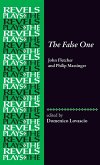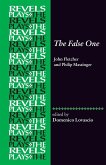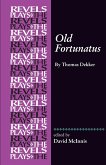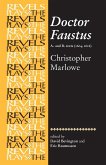Volpone, or The Fox
Ben Jonson
Herausgeber: Parker, Brian
22,99 €
inkl. MwSt.
Versandfertig in 1-2 Wochen

11 °P sammeln
Volpone, or The Fox
Ben Jonson
Herausgeber: Parker, Brian
- Broschiertes Buch
- Merkliste
- Auf die Merkliste
- Bewerten Bewerten
- Teilen
- Produkt teilen
- Produkterinnerung
- Produkterinnerung
The most thoroughly investigated edition of Volpone to date -- .
Andere Kunden interessierten sich auch für
![The False One The False One]() The False One111,99 €
The False One111,99 €![The Massacre at Paris The Massacre at Paris]() The Massacre at Paris37,99 €
The Massacre at Paris37,99 €![The False One The False One]() The False One37,99 €
The False One37,99 €![Old Fortunatus Old Fortunatus]() Old Fortunatus32,99 €
Old Fortunatus32,99 €![Old Fortunatus Old Fortunatus]() Old Fortunatus120,99 €
Old Fortunatus120,99 €![The Massacre at Paris The Massacre at Paris]() The Massacre at Paris111,99 €
The Massacre at Paris111,99 €![Doctor Faustus, A- and B- Texts 1604 Doctor Faustus, A- and B- Texts 1604]() Eric RasmussenDoctor Faustus, A- and B- Texts 160421,99 €
Eric RasmussenDoctor Faustus, A- and B- Texts 160421,99 €-
-
-
The most thoroughly investigated edition of Volpone to date -- .
Hinweis: Dieser Artikel kann nur an eine deutsche Lieferadresse ausgeliefert werden.
Hinweis: Dieser Artikel kann nur an eine deutsche Lieferadresse ausgeliefert werden.
Produktdetails
- Produktdetails
- The Revels Plays
- Verlag: Manchester University Press
- 2 ed
- Seitenzahl: 376
- Erscheinungstermin: 8. April 2011
- Englisch
- Abmessung: 216mm x 140mm x 23mm
- Gewicht: 508g
- ISBN-13: 9780719030932
- ISBN-10: 0719030935
- Artikelnr.: 21289024
- Herstellerkennzeichnung
- Libri GmbH
- Europaallee 1
- 36244 Bad Hersfeld
- gpsr@libri.de
- The Revels Plays
- Verlag: Manchester University Press
- 2 ed
- Seitenzahl: 376
- Erscheinungstermin: 8. April 2011
- Englisch
- Abmessung: 216mm x 140mm x 23mm
- Gewicht: 508g
- ISBN-13: 9780719030932
- ISBN-10: 0719030935
- Artikelnr.: 21289024
- Herstellerkennzeichnung
- Libri GmbH
- Europaallee 1
- 36244 Bad Hersfeld
- gpsr@libri.de
Benjamin Jonson (c. 11 June 1572 - c. 16 August 1637[2]) was an English playwright and poet, whose artistry exerted a lasting impact upon English poetry and stage comedy. He popularised the comedy of humours. He is best known for the satirical plays Every Man in His Humour[3] (1598), Volpone, or The Fox (c. 1606), The Alchemist (1610) and Bartholomew Fair (1614) and for his lyric and epigrammatic poetry. "He is generally regarded as the second most important English dramatist, after William Shakespeare, during the reign of James I."[4] Jonson was a classically educated, well-read and cultured man of the English Renaissance with an appetite for controversy (personal and political, artistic and intellectual) whose cultural influence was of unparalleled breadth upon the playwrights and the poets of the Jacobean era (1603-1625) and of the Caroline era (1625-1642) In midlife, Jonson claimed that his paternal grandfather, who 'served King Henry 8 and was a gentleman',[7] was a member of the extended Johnston family of Annandale in the Dumfries and Galloway, a genealogy that is attested by the three spindles (rhombi) in the Jonson family coat of arms: one spindle is a diamond-shaped heraldic device used by the Johnston family. Jonson's father lost his property, was imprisoned, and suffered forfeiture under Queen Mary; having become a clergyman upon his release, he died a month before his son's birth.[8] Jonson's mother married a master bricklayer two years later.[9][10] Jonson attended school in St Martin's Lane.[3] Later, a family friend paid for his studies at Westminster School, where the antiquarian, historian, topographer and officer of arms, William Camden (1551-1623) was one of his masters. In the event, the pupil and the master became friends, and the intellectual influence of Camden's broad-ranging scholarship upon Jonson's art and literary style remained notable, until Camden's death in 1623. On leaving Westminster School, Jonson was to have attended the University of Cambridge, to continue his book learning but did not, because of his unwilled apprenticeship to his bricklayer stepfather.[5][9] According to the churchman and historian Thomas Fuller (1608-61), Jonson at this time built a garden wall in Lincoln's Inn. After having been an apprentice bricklayer, Ben Jonson went to the Netherlands and volunteered to soldier with the English regiments of Francis Vere (1560-1609) in Flanders.
Introduction 1. The text 2. The play 3. Critical appreciation 4. Stage
history Volpone, or The Fox Appendices A. The music (by John P Cutts) B.
Source materials and analogues C. Modern productions and adaptations D.
Collations of 1607 Quarto and 1616 Folio Index to the annotations
history Volpone, or The Fox Appendices A. The music (by John P Cutts) B.
Source materials and analogues C. Modern productions and adaptations D.
Collations of 1607 Quarto and 1616 Folio Index to the annotations
Introduction 1. The text 2. The play 3. Critical appreciation 4. Stage
history Volpone, or The Fox Appendices A. The music (by John P Cutts) B.
Source materials and analogues C. Modern productions and adaptations D.
Collations of 1607 Quarto and 1616 Folio Index to the annotations
history Volpone, or The Fox Appendices A. The music (by John P Cutts) B.
Source materials and analogues C. Modern productions and adaptations D.
Collations of 1607 Quarto and 1616 Folio Index to the annotations
